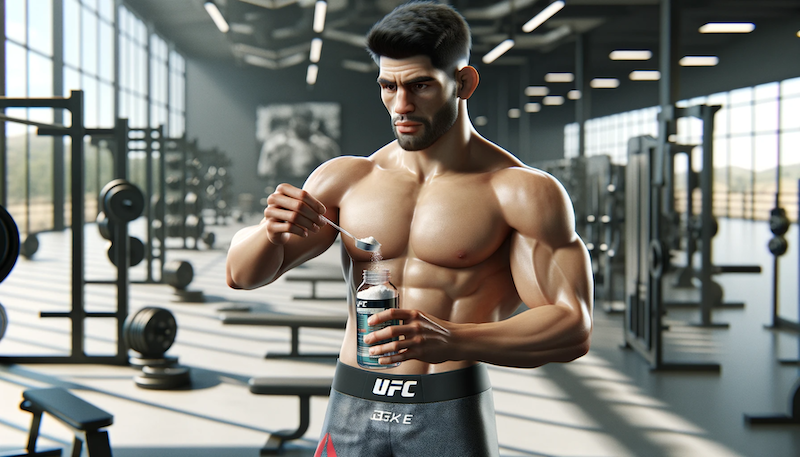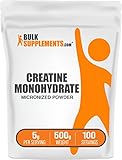
In the world of MMA and the UFC, the use of supplements to enhance performance is a topic of keen interest and debate.
Among these, creatine stands out due to its well-documented benefits in increasing muscle mass, strength, and overall exercise performance.
However, its application in a sport as demanding and weight-class-oriented as MMA presents unique challenges and considerations.
In this article, we delve into the complexities of creatine use among UFC fighters, exploring its benefits, limitations, and the practical aspects of its supplementation.
Contents
Can UFC (MMA) Fighters Take Creatine?
Yes, UFC fighters can take creatine as it’s not on the World Anti-Doping Agency (WADA) list of prohibited substances.
Creatine is a legal supplement widely used in various sports for its benefits in increasing muscle mass, strength, and exercise performance.
It works by increasing the availability of ATP (adenosine triphosphate), the primary energy molecule used during high-intensity exercise, thereby enhancing short-term performance and recovery.
UFC fighters can utilize creatine for these benefits, though it’s important to note that while creatine can be considered performance-enhancing, the effects vary among individuals and aren’t guaranteed.
Additionally, creatine has a well-established safety profile when used appropriately.
Creatine is naturally produced in the liver from amino acids and is found in foods such as milk, fish, and red/white meat.
Its supplementation is particularly beneficial in sports like MMA, where explosive strength and power are crucial.
Do UFC Fighters Take Creatine?
Most UFC fighters don’t use creatine due to the need to cycle off creatine 3-4 weeks before a fight to facilitate weight cutting, as creatine can cause water retention. This means the benefits of creatine aren’t experienced during a fight.
However, heavyweights and fighters with infrequent fight schedules (once or twice per year) find it beneficial and do take creatine. These groups can leverage the muscle-building and performance-enhancing effects of creatine without the immediate pressure of weight cutting.
Let’s take a closer look at all the reasons why most UFC fighters don’t take creatine and why heavyweights and inactive UFC fighters do take creatine.
Reasons Why Most UFC Fighters Don’t Take Creatine
1. Weight Management and Creatine Cycling
Cycling Off Before Fights: Fighters need to stop creatine use 3-4 weeks before a fight to reduce water retention, crucial for making weight.
Limited Time for Benefits: Since creatine’s benefits take weeks to manifest, fighters often can’t utilize these benefits during the actual fight due to the cycling-off period.
2. Impact on Fight Performance
Fluctuating Benefits: The need to cycle off creatine before fights lead to inconsistent performance levels.
Fighters may experience enhanced strength and power during training while on creatine, but these benefits diminish once they stop supplementation.
Fighters might struggle with the change in their physical capabilities, as the strength and power gains from creatine use aren’t maintained during the fight.
3. Ineffectiveness Compared to Muscle Gain
Water Retention: Creatine causes water retention, leading to a weight gain of 2 to 5 lbs, which is a significant concern for fighters in weight-restricted classes.
Preference for Muscle or Fat Weight: Fighters generally prefer weight gain in the form of muscle or fat, rather than water weight, for better performance and weight class management.
4. Ineffectiveness Compared to PEDs
Prevalence of Stronger Substances: In the context where some UFC fighters might be using steroids or other powerful PEDs, the incremental benefits of creatine are much less significant.
These stronger substances have more pronounced and powerful effects on performance enhancement. For most UFC fighters taking steroids or PEDs, creatine would never cross their mind.
5. Not Enough Time for Any Benefits
Delayed Onset of Benefits: Creatine typically requires about 4 weeks of consistent use to manifest noticeable benefits.
For the average active UFC fighter, who fights 3 or 4 times per year (every 3 or 4 months), this delay can significantly limit the practicality of using creatine.
With the need to cycle off creatine 3-4 weeks before a fight and the 4 weeks required to feel its benefits, this leaves a very limited window where the benefits can be effectively utilized, rendering it pointless.
Reasons Why Heavyweights and Inactive UFC Fighters Take Creatine
1. Less Stringent Weight Limits for Heavyweights
Tolerance for Weight Gain: The 265 lb weight limit in the heavyweight class makes the minor weight gain from creatine a nonissue.
Reduced Need for Weight Cutting: Heavyweights often don’t need to cut weight as aggressively, allowing for continuous creatine use and benefits.
2. Long Training Periods for Infrequent Fighters
Extended Benefit Period: Fighters with fewer fights per year can use creatine during longer training periods, maximizing its muscle-building and performance-enhancing effects.
No Immediate Weight Cutting Pressure: With infrequent fight schedules, these fighters face less immediate pressure to cycle off creatine to cut weight before a fight.
Sustained Use for Longer Benefits: The ability to use creatine continuously without the need to cycle off for fights allows for sustained benefits.
Is Creatine Good for MMA?
On the whole, creatine is great for MMA training due to its various performance-enhancing effects. However, its suitability varies depending on the level of competition and specific circumstances of the athlete.
Benefits of Creatine for MMA
- Increased Power and Strength: Creatine is known for enhancing muscle strength and power, which are crucial for striking and grappling in MMA.
- Improved High-Intensity Performance: It aids in short bursts of intense activity, a common aspect of MMA training and competition.
- Enhanced Muscle Recovery: Creatine can help with muscle recovery, allowing for more effective training sessions.
Limitations for Professional Fighters
- Steroid and PED Use: At the professional level, such as in the UFC, the use of steroids and PEDs, which offer more potent performance enhancements, might make the benefits of creatine seem less significant.
- Weight Management Issues: The water retention caused by creatine can hinder weight cutting, a critical aspect for professional fighters in maintaining their weight class.
Suitability for General MMA Practitioners
- Natural Athletes: For MMA practitioners not involved in professional competition or those not using steroids/PEDs, creatine can be a valuable supplement to enhance training outcomes.
- Non-Competitive Training: Those training in MMA for fitness, skill development, or as a hobby can benefit from creatine without the concerns of weight classes or stringent competition schedules.
When Should I Stop Taking Creatine Before an MMA Fight?
You should stop taking creatine approximately 3-4 weeks before an MMA fight, especially if you’re competing in a weight class with strict limits.
This timeframe is recommended to allow your body to shed the water weight commonly associated with creatine use.
Since creatine can lead to water retention, discontinuing it well before the weigh-in is crucial for fighters who need to meet specific weight class requirements.
This approach helps ensure that the water weight gained from creatine doesn’t hinder the weight-cutting process.
If you don’t need to cut weight because you’re fighting at your natural weight class or you’re a heavyweight with much more room for maneuver, then you don’t have to stop taking creatine.
The Bottom Line
UFC fighters can take creatine because it’s not on WADA’s prohibited substance list, but should they?
Creatine, while beneficial for muscle strength and power, its effectiveness and practicality vary significantly based on the fighter’s weight class, competition frequency, and individual physiological response.
For heavyweights and less active fighters, creatine offers substantial benefits without the stringent constraints of weight cutting.
However, most UFC fighters don’t take creatine because it hinders them from cutting weight, they have to stop taking it and therefore don’t experience any of its benefits when fighting, it makes them heavier than normal, and creatine is extremely useless when compared to steroids and PEDs.







